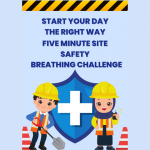As we come to the end of April, we also come to the end of Stress Awareness Month. April has been celebrated as Stress Awareness Month every year since 1992, however this year it feels particularly important. In a recent study by the American Psychological Association, nearly half of parents (48%) said their level of stress has increased as a result of the pandemic. Stress is a natural part of life, but when not managed properly, it can lead to long-term emotional and physical side effects, outlined by WebMD here. As part of our Wellness Wednesday series, Touchplan decided to compile some of the best ways to manage and reduce stress.
Exercise
Physical activity helps increase the production of endorphins and reduces levels of stress hormones, such as cortisol and adrenaline. Regular exercise is known to improve self-image and self-confidence. Exercise routines also help maintain mental fitness, improving alertness and concentration, and enhancing overall cognitive function. Scientists have also found that physical activity can also help to improve sleep. The Mayo Clinic looks deeper at the effects of exercise on sleep here.
Meditate
Meditation is an age-old practice that has recently become one of the more popular methods of stress relief. Meditation can be part of your daily routine to help cope with and reduce stress. Through learning how to calm your body and mind, physical and emotional stress can melt away. Meditation affects the body in the exact opposite way that stress does — by prompting the body’s relaxation response. VerywellMind has an overview of meditation here. If you are interested in learning how to meditate, Calm is a mobile app with many guided meditations for beginners.
Eat Well
Maintaining a proper diet can counterbalance the impact of stress by strengthening the immune system, stabilizing mood, and reducing blood pressure. Some important nutrients for stress reduction are Vitamin C, which reduces stress and boosts the immune system; complex carbohydrates, which induce serotonin production and stabilize blood pressure; magnesium, which helps avoid fatigue and improves sleep; Omega-3 fatty acids, which reduce surges of stress hormones and protect against depression. You can find additional suggestions for more stress-fighting foods here.
Sleep
Stress and sleep have a two-way relationship. Stress can lead to sleep loss, and sleep loss can increase stress. Stress often increases how long it takes to fall asleep, affects REM and deep sleep negatively, and leads to increased nighttime awakenings. A great way to reduce nighttime stress is by establishing a consistent sleep schedule. This helps waking up in the morning, sleeping soundly, and reducing the amount of sleep needed. Sleepscore has more tips on improving sleep to reduce stress here.
While there are many other ways to manage and reduce stress, these are some of the most frequently recommended tips. Stress is an inevitable part of life, and can even be healthy, but it must be managed properly.
If you missed out last wellness post be sure to read Five Healthy Habits to Incorporate into Your Springtime Routine and be sure to check back every other Wednesday for another #WellnessWednesday blog post!










